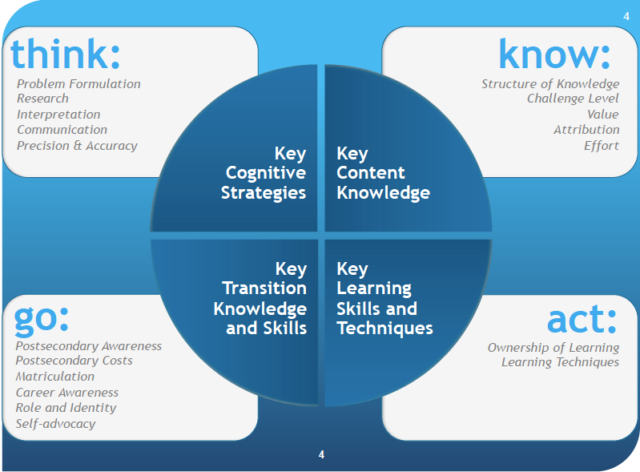Discovery Education supports college and career readiness by providing students resources to develop the knowledge, skills, and dispositions necessary to succeed.
Spotlight on Strategies
See the Top 10 SOS Instructional Strategies for College and Career Readiness (Canadian Subscribers) to integrate in everyday teaching practice to scaffold students in mastering the knowledge, skills, and dispositions necessary to be college and career ready.
College and career ready means that students graduate from high school prepared to enter and succeed in post-secondary opportunities—whether college or career—without need for remediation.
To be college and career ready, students must graduate with the knowledge, skills, and dispositions necessary to succeed. To do this, schools must help enable students to:
- Develop key cognitive strategies
- Master core content
- Take ownership of their learning
- Become proficient with a range of learning strategies
Discovery Education supports college and career readiness by providing schools, teachers, and students resources to develop cognitive strategies, content mastery, ownership of learning, and learning strategies.

Conley, D. T. (n.d.). What Does It Mean to be College and Career Ready? Retrieved May 1, 2018, from https://www.edweek.org/media/conley-23collegeready.pdf
Key Cognitive Strategies
Problem Formulation | Research | Interpretation | Communication | Precision & Accuracy
Discovery Education student accounts give students opportunities to hone their research skills through:
- Search strategies, filtering, and comparing and selecting resources
- Organizing content with My Content folder structures
- Reinforcing the importance of giving credit with auto-generated citations
Learn more in Researching and Finding Information with Discovery Education.
Discovery Education creation tools and instructional ideas give students meaningful ways to demonstrate their understanding and practice their communication skills:
- With Discovery Education Studio, students design, build, and synthesize multiple types of digital content on digital “boards”.
- Instructional strategies from the SOS Instructional Strategies series suggest ways students can communicate their ideas, discoveries, and conclusions—like creating Paper Slide videos.
Learn more in Communicating Ideas with Discovery Education.
Key Content Knowledge
Structure of Knowledge | Challenge Level | Value | Attribution | Effort
Discovery Education allows access to a range of content across grades and disciplines that is:
- Multimodal, offering a variety of content types, including images, audio, video, text, interactives, and more to provide multiple representations of the content
- Standards-aligned with resources that directly instruct—or support the instruction of—local or national education standards with browse By Standard.
- Organized by subject with curated resources for different areas of instruction.
Key Learning Skills and Techniques
Self-Awareness | Goal-Setting | Motivation | Persistence | Performance-Monitoring | Asking for Help | Self-Efficacy
To help students develop the learning skills of ownership, persistence, and self-awareness, Discovery Education gives students the opportunity to explore their Interests, skills and passions.
Learn more in Explore Your Interests with Discovery Education.
There are a variety of SOS Instructional Strategies that structure learning experiences to reinforce learning techniques like managing time, taking notes, learning collaboratively, and using technology. Discovery Education also supports students organizing their notes and learning with My Content and Favorites.
Learn more with Organizing Evidence with Discovery Education and Studying and Review with Discovery Education.
Key Transition Knowledge and Skills
Postsecondary Awareness | Postsecondary Costs | Matriculation | Career Awareness | Role and Identity | Self-advocacy
Discovery Education partners with nonprofit foundations and global corporations to provide real-world experiences and resources that give students opportunities to explore careers, postsecondary pathways, and connect to college preparation and access programs.
See all Corporate Educational Partnerships partnerships.
Virtual Field Trips provide opportunities for students to learn about careers they may not know exist, while STEM Career Challenges engage students in scenario-based learning about STEM career pathways that students might not otherwise have considered.